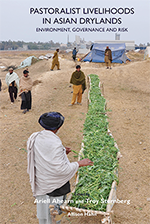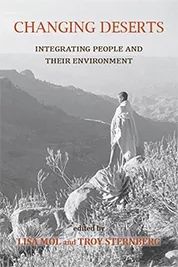Dr Troy Sternberg
Senior Researcher
Senior Researcher
Academic Profile
Extensive travel led to Troy's interest in desert regions, environments and people. Thoughts on how arid lands functioned and why there was such great diversity and extent led to his DPhil on pastoral environments in the Gobi Desert (Oxford, 2009). Research focused on extreme climate hazards (drought, dzud), environments (water, steppe vegetation, desertification) and social dynamics (pastoralists, social-environmental interaction, mining and communities). Since 2005 Troy has continued to research in Mongolia; in 2010 northern China and in 2015 Central Asia became additional study sites. More recently work on drought and the Arab Spring has stimulated interest in how environmental factors contribute to contemporary conflict and displacement. In 2018 this led to visits to the Za'atari Refugee Camp, Jordan, Al-Shati Camp, Gaza and Colombia where 1 million+ Venezuelan refugees now reside.
In 2016 Troy was part of a key investigation in to how infrastructure affects environmental and social viability in the Gobi Desert. Driven by the $12 billion Oyu Tolgoi mega-mine (copper, gold) and Chinese development, the research highlighted the forces of change, contradictions between modernisation and tradition and how community perception and physical landscapes evolve over time. This led to his current work on the ESRC-GCRF Inclusive Societies 'Gobi Framework: Mediation model for sustainable infrastructure development'.
Troy has received awards and scholarships from the Royal Geographical Society, British Academy, Oman-Thesiger Desert Fellowship, British Science Association, UK-China Visiting Scholars, US Fulbright Fellow, the EU's 'Drylands Facing Change' and the UK Special Talent visa. He feels travel is an integral part of geography and encourages engagement and understanding of our globalised world.
Current Research
The Gobi Framework project develops a model for sustainable infrastructure development to promote inclusive social and economic development and sustainable environments in the context of Chinese investment initiatives in Mongolia, Kyrgyzstan and Tajikistan. Across Asia China's £1 trillion Belt and Road Initiative (BRI) is set to transform societies, economies and landscapes through infrastructure megaprojects. The project region has fragile environments, a lack of water, extreme geography (deserts, mountains) and temperature (+40C to -45C) that are matched with limited state capacity, poverty, rural isolation and ex-Soviet structures and thought. In this context responsibility, cooperation and transparency are key themes as we work to scale up a pioneering dispute resolution model from Mongolia to Central Asia and beyond.
Troy works with the University of Central Asia, Mongolian Institute of Geography, the Chinese Academy of Sciences, the Kazakh National University, Mongolian National University, the University of Nagoya and Rakuno Gakuen University, Japan. He teaches on Water and Society in the Middle East, supervises dissertations, is the UK member of the EU's Drylands Facing Change initiative and organises the Oxford Desert Conference series (next in 2020).
Selected Publications







